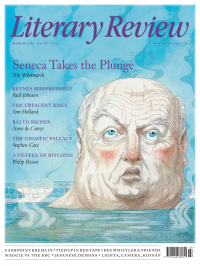Saul David
Our Finest Hour?
Went the Day Well? Witnessing Waterloo
By David Crane
William Collins 366p £20
Waterloo: Great Battle Series
By Alan Forrest
Oxford University Press 240pp £18.99
Now that the initial deluge of books commemorating the bicentenary of the Battle of Waterloo has slowed to a trickle, it is refreshing to see the publication of two histories that observe 18 June 1815 from a much broader cultural perspective.
David Crane has form with this type of approach. His Empires of the Dead, an account of the creation of the War Graves Commission, was described by one reviewer as the ‘most original, shortest and best written of the year’s tsunami of books on the impact of the Great War’ and was deservedly shortlisted for the Samuel Johnson Prize. He tries to do something similar with Went the Day Well?, shifting the narrative from the battlefield to Britain and back again and working in a huge cast of disparate characters in contrasting settings. His declared intention is to explore ‘the intersection of the private and public spheres’ and the ‘ways in which individuals are touched by remote events, and how much – or how little – of what we usually think of as mainstream history actually impinged on the lives of ordinary men and women who witnessed Waterloo’.
The book is broken up into twenty-four main chapters, each one representing an hour of the day of battle. Of course, to give proper context the story is not confined to that hour alone, nor is the time always particularly relevant. The first chapter – ‘Midnight: Belgium’ – introduces Magdalene

Sign Up to our newsletter
Receive free articles, highlights from the archive, news, details of prizes, and much more.@Lit_Review
Follow Literary Review on Twitter
Twitter Feed
‘The Second World War was won in Oxford. Discuss.’
@RankinNick gives the question his best shot.
Nicholas Rankin - We Shall Fight in the Buttery
Nicholas Rankin: We Shall Fight in the Buttery - Oxford’s War 1939–1945 by Ashley Jackson
literaryreview.co.uk
For the first time, all of Sylvia Plath’s surviving prose, a massive body of stories, articles, reviews and letters, has been gathered together in a single volume.
@FionaRSampson sifts it for evidence of how the young Sylvia became Sylvia Plath.
Fiona Sampson - Changed in a Minute
Fiona Sampson: Changed in a Minute - The Collected Prose of Sylvia Plath by Peter K Steinberg (ed)
literaryreview.co.uk
The ruling class has lost its sprezzatura.
On porky rolodexes and the persistence of elite reproduction, for the @Lit_Review: